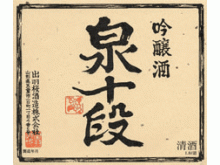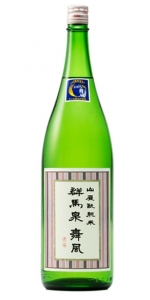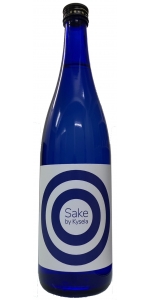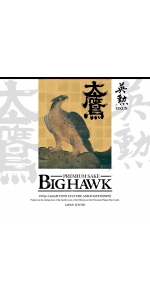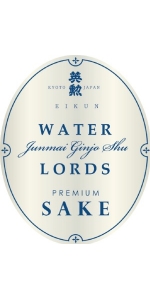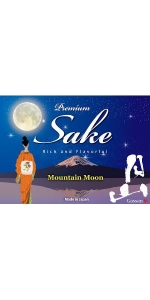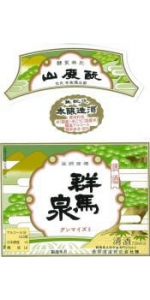Sake Dewazakura Izumi Judan Tenth Degree (720ml)
| Country: | Japan |
| Region: | Yamagata |
| Winery: | Dewazakura Brewing Company |
| Grape Type: | Miyamanishiki (kojimai) (Sake) |
| Vintage: | NV |
| Bottle Size: | 720 ml |
Savory nuances of toasted quinoa, banana bread, and nutmeg are present in the nose. On the palate, this sake is layered, lifted and complex, with flavors of plantain, dried cranberry, nougat, white Mushroom and almond.
POLISHING RATIO: 60%
ALCOHOL: 15-16%
SMV +/-: +3.0
RICE KAKE: 50% WAKAMIZU 50% LOCALLY FARMED JAPANESE RICE
YEAST STRAIN: PROPRIETARY
Sake By Kysela has been a project in the making for three years now. In the end, we selected a Sake made from the famous Yamada Nishiki rice produced in the Southern Prefecture of Shimane. Flavorful, rich, and clean; this sake is best as an aperitif or with seafood like fluke, dover sole or halibut. Kanpai!!!
Rice milling: 60%
Rice varietal: Iwai (Only available in Kyoto)
Alcohol: 15%
Sake meter value: +3.0
Acidity: 1.3
Tasting Notes: --------
Eikun sake uses water from a source called "Fusui", rated as one of the top 100 sources of water in Japan. This water source is located just south of the ancient Japanese, and still cultural capital of Japan, Kyoto.
Review:
"Clear with a platinum blue cast. Aromas of coconut milk, melon, pear and rice pudding with a with a supple, dry-yet-fruity medium body and a vanilla, apple, and pepper accented finish. A robust and lively sake that will sing with spicy Asian cuisine."
- Beverage Testing Institute (July 2nd 2014), 91 pts
Sake Eikun Junmai Ginjo Water Lords is made with Iwai rice.
Eikun sake uses water from a source called "Fusui", rated as one of the top 100 sources of water in Japan. This water source is located just south of the ancient Japanese, and still cultural capital of Japan, Kyoto.
Aromas of macadamia oatmeal cookie, spicy zucchini bread, and vanilla cream with a satiny fruity-yet-dry medium-to-full body and a layered, banana custard, jicama, salted whole nut, apple, and radish nuanced finish. A Wonderfully vibrant and flavorful sake.-Beverage Tasting Institute 94 points (Exceptional)
RATING: 94 points (Exceptional)
CATEGORY: Junmai Ginjo Sake, Sake
ALCOHOL BY VOLUME: 15.3%
TASTING LOCATION: In Our Chicago Tasting Room
TASTING DATE: Dec-05-2012
WINE ID: 200768
Woodsy honeycomb, nutshell, and mushroom patch aromas with a satiny fruity-yet-dry medium-to-full body and a delicate savory mushroom stock, chestnut, and golden beet driven finish. A fine choice for tempura. 91 Points -Beverage Tasting Institute
RATING: 91 points (Exceptional)
CATEGORY: Junmai Ginjo Sake, Sake
ALCOHOL BY VOLUME: 15.4%
TASTING LOCATION: In Our Chicago Tasting Room
TASTING DATE: Dec-05-2012
WINE ID: 200767
TASTING NOTES:
This is a classic, delicious Honjozo with crimini mushroom, almonds and lilac aromas. The first sip of this sake is full of stone fruit and minerals complimented by notes of caramel, cocoa and almond and finishes with plenty of umami.
POLISHING RATIO: 60%
ALCOHOL: 16-17%
SMV +/-: +3.0
ACIDITY: 1.6
RICE KOJI: JAPANESE RICE 100%
RICE KAKE: JAPANESE RICE 100%
YEAST STRAIN: KYOKAI
FOOD PAIRINGS: Chinese Food, One Pot dishes like Beef Stew.
CHEESE PAIRINGS: Foggy Morning, Prima Donna, Domaine de Village
Sake Dewazakura Izumi Judan Tenth Degree is a martini-lover's sake: clear, high-octane and bone dry, with a hint of juniper reminiscent of Tanquerary. No other ginjo combines dryness (+12 on the sake scale) and edginess (36 proof) to such exhilarating effect. A peerless sake with toro and hamachi or serve with salmon roe, caviar and cocktail canapes. Drink well-chilled after forty minutes in the freezer.
Rice Variety: Miyamanishiki
Polishing Ratio: 50%
Alcohol Percentage: 17.5%
Sake Meter Value: +12.0
Acidity: 1.4
Yeast Type: Yamagata YK-0107
Dewazakura Brewing Company
Many sake enthusiasts are surprised to learn that twenty-five years ago ginjo labels were hard to find in Japan. In those days, people were still drinking the cloyingly sweet sakes the breweries had been churning out since the ’50s; no one thought that customers would actually pay more for the quality ginjo and daiginjo sakes brewed in limited amounts for competitions.
In 1981, Dewazakura Brewing Company changed that with the release of "Oka," an affordably priced ginjo label with a polishing ratio of 50 percent and a lovely floral aroma. It was light, crisp and delightful. It was made to be drunk cold. Soon other breweries introduced their own ginjo labels. And so began one of the most creative periods in the history of sake, earning for Dewazakura the admiration and respect of even its most ardent competitors.
What made the brewery stand out was a drive for innovation. Dewazakura was not a wealthy brewery, or a long-established one, but they were open to change. When the opportunity arose in the years after the war to invite research technicians in from the National Research Institute of Brewing, they jumped at the chance. Drawing on the knowledge and skill of Hideo Abe, a former Institute research advisor, they put new ideas into practice without hesitation.
By 1991, Dewazakura had perfected its cold storage technique, aging freshly pressed sake at 28 degrees Fahrenheit to keep it as aromatic and flavorful as possible until bottling. In 1996 it introduced "Dewasansan," brewed from a new Yamagata rice strain of the same name, another hit which opened the way for other prefectures to introduce highly specific regional labels. This year, for the first time in history, Yamagata breweries received more gold medals than any other prefecture at the 2004 Japan National Sake Appraisal, an achievement due in no small measure to the pioneering efforts of the Dewazakura Brewing Company.
Woodsy honeycomb, nutshell, and mushroom patch aromas with a satiny fruity-yet-dry medium-to-full body and a delicate savory mushroom stock, chestnut, and golden beet driven finish. A fine choice for tempura. 91 Points -Beverage Tasting Institute
RATING: 91 points (Exceptional)
CATEGORY: Junmai Ginjo Sake, Sake
ALCOHOL BY VOLUME: 15.4%
TASTING LOCATION: In Our Chicago Tasting Room
TASTING DATE: Dec-05-2012
WINE ID: 200767
- back
Mark your calendars for June! Caymus 50th Anniversary Napa Valley Cabernet Sauvignon 2022 is a testament to fifty years of exceptional winemaking by the dedicated, passionate, and family-owned Caymus Vineyards. Since 1972, they have remained a beacon of excellence in Napa Valley, staying true to their roots and producing unparalleled Cabernet Sauvignon. This limited edition wine is a celebration of their rich history, tradition, and relentless pursuit of quality across generations.
Ferren Pinot Noir Silver Eagle Vineyard is made from 100 percent Chardonnay.
Winemaker Matt Courtney learned what he knows of Chardonnay on the Sonoma Coast during his eight-year apprenticeship with Helen Turley of Marcassin Vineyards. At Ferren he employs artisan methods crafting his wines in small lots from single-vineyard sources with native fermentation and without fining or filtration. | Falling Bright
Silver Eagle Vineyard rests atop Stoetz Ridge, the land mass that divides the remote Sonoma Coast from the Russian River Valley. This vineyard experiences both the cooling ocean breezes of the nearby Pacific, as well as the warmth of the interior valley. The Chardonnay made from this unique confluence of climates is extraordinary; a fascinating juxtaposition of briny minerality and candied citrus.
Review:
"A stunning, concentrated and expressive Chardonnay, with notes of orange blossoms, candied lemon peel, crunchy star fruit and pear. Offers accents of salted Marcona almond, tarragon and lemon verbena, plus a vibrant thread of acidity, along with lingering hints of white tea, green cardamom and ginger. Drink now through 2037.—M.W.”
- Wine Spectator (May 2025), 95 pts

